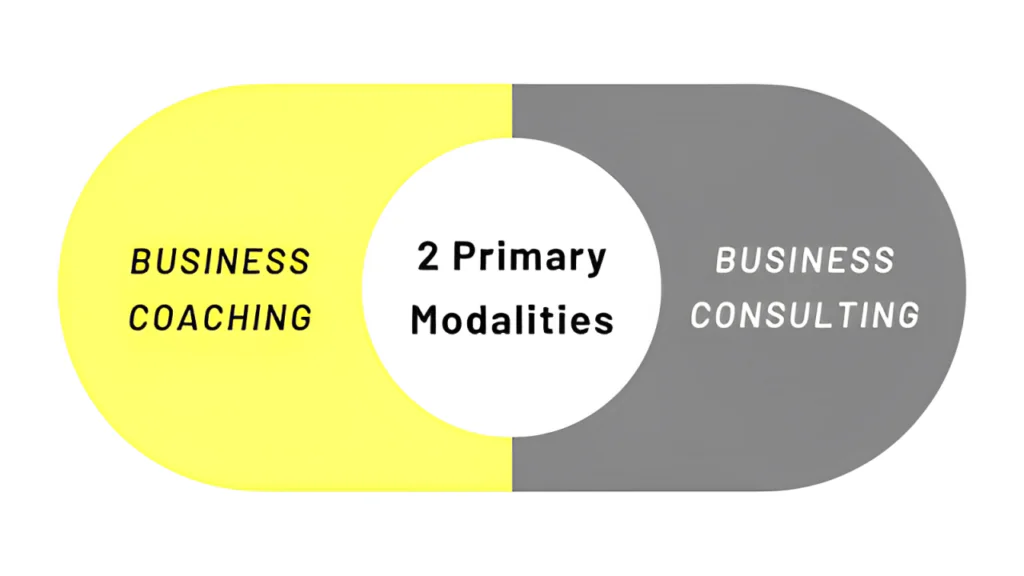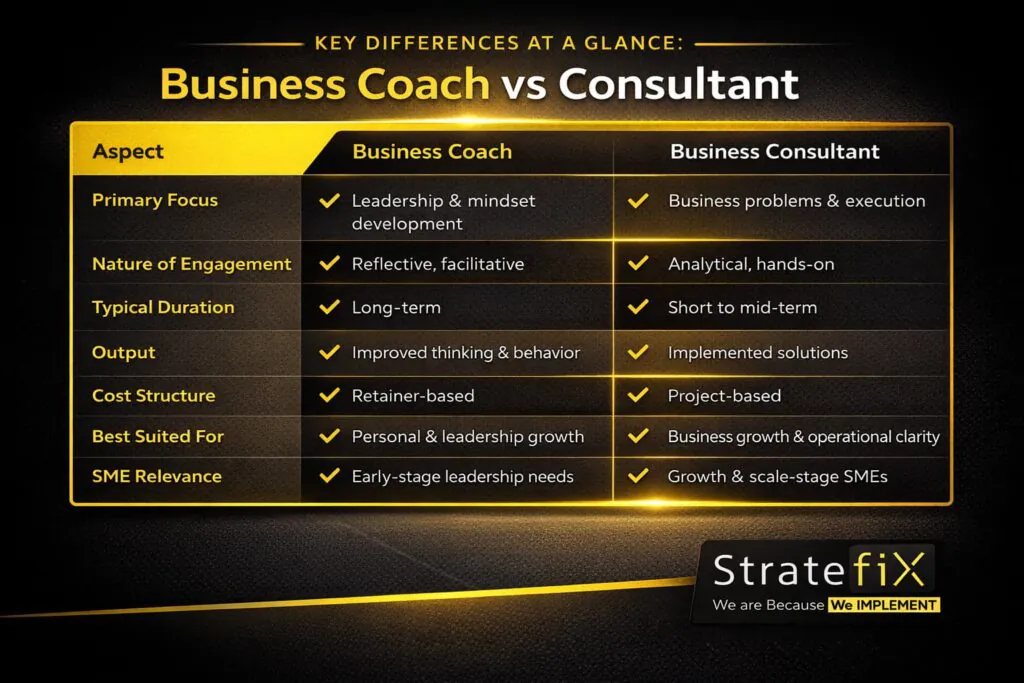When business gets confusing, don’t flip a coin flip through the playbook of business coaches and consultants.
Spoiler: They are not the same.
In today’s fast-evolving business environment, founders, CXOs, and decision-makers often seek external expertise to navigate growth challenges, leadership complexity, and operational bottlenecks. Two commonly considered options are business coaching and business consulting frequently used interchangeably, yet fundamentally different in purpose and impact.
Understanding the difference between a business consultant vs coach is critical, especially for SMEs where time, capital, and execution speed matter.
Business Coaching and Business Consulting: Two Distinct Approaches

Although both aim to improve organizational effectiveness, they differ significantly in methodology, involvement, and outcomes.
Essence of Professional Mentoring (Business Coaching)
Business coaching focuses on personal and leadership development. A coach works as a facilitator, helping leaders uncover answers from within rather than prescribing solutions.
The emphasis is on:
- Leadership mindset and confidence
- Decision-making capability
- Self-awareness and behavioural change
- Long-term personal and team development
Coaches often support entrepreneurs across areas like leadership, communication, and strategic thinking. The outcome is better leaders, not necessarily immediate business fixes.
In short, coaching is about growth from within.
Essence of Strategic Execution (Business Consulting)
Business consulting, on the other hand, is problem-centric and execution-oriented.
Consultants bring domain expertise, external perspective, and hands-on involvement to diagnose issues and implement solutions. Their role extends beyond advice to on-ground execution, covering areas such as strategy, operations, sales, HR, and finance.
Consulting is pragmatic by nature:
- Problems are defined
- Solutions are designed
- Execution is driven
- Results are measured
For SMEs, this distinction is crucial. Consulting does not stop at recommendations—it focuses on making change happen.
Why Execution Matters as Much as Advice
Essence of Professional Mentoring
Expert advice alone does not guarantee success. Strategy without execution remains theoretical.
Effective consulting requires:
- Validating whether a strategy is practical and executable
- Defining clear milestones and success metrics
- Assigning ownership and accountability
- Building alignment and buy-in across teams
- Continuously recalibrating based on real-world feedback
This is where strategic execution differentiates consulting from coaching.

This comparison often helps answer the question many founders ask:
Which is better business coach or consultant? The answer depends on the problem you are solving.
When Should You Hire a Business Consultant?
You should consider consulting when:
- Business growth has stalled despite effort
- Execution gaps are visible across functions
- Systems, processes, or accountability are broken
- You need faster, measurable outcomes
For SMEs, consulting delivers clarity and speed when execution gaps are costing money, time, or market opportunity.
When Does a Business Coach Work Better?
Coaching is more effective when:
- Leadership confidence is low
- Decision paralysis exists
- Founder burnout is affecting direction
- Teams need alignment rather than structural change
Coaching strengthens the individual. Consulting strengthens the business.
SME Consulting vs Coaching: What Most Growing Businesses Actually Need
For most SMEs, the real question is not coaching vs consulting, but what problem needs solving first.
- Coaching helps leaders think better
- Consulting helps businesses perform better
In growth-stage SMEs, execution gaps usually cost far more than mindset gaps. Delayed decisions, weak processes, and lack of ownership directly impact profitability and scalability.
Conclusion: Choosing the Right Path Forward
Business coaching and business consulting are not competing services they serve different purposes at different stages.
Organizations that understand this distinction make better choices, allocate resources wisely, and progress faster through uncertainty.
The synergy of the two clarity of thought supported by disciplined execution helps businesses navigate complexity and thrive in a constantly changing environment.







